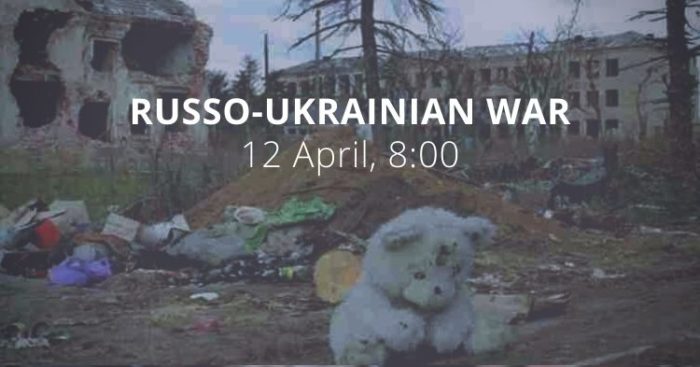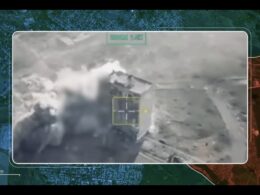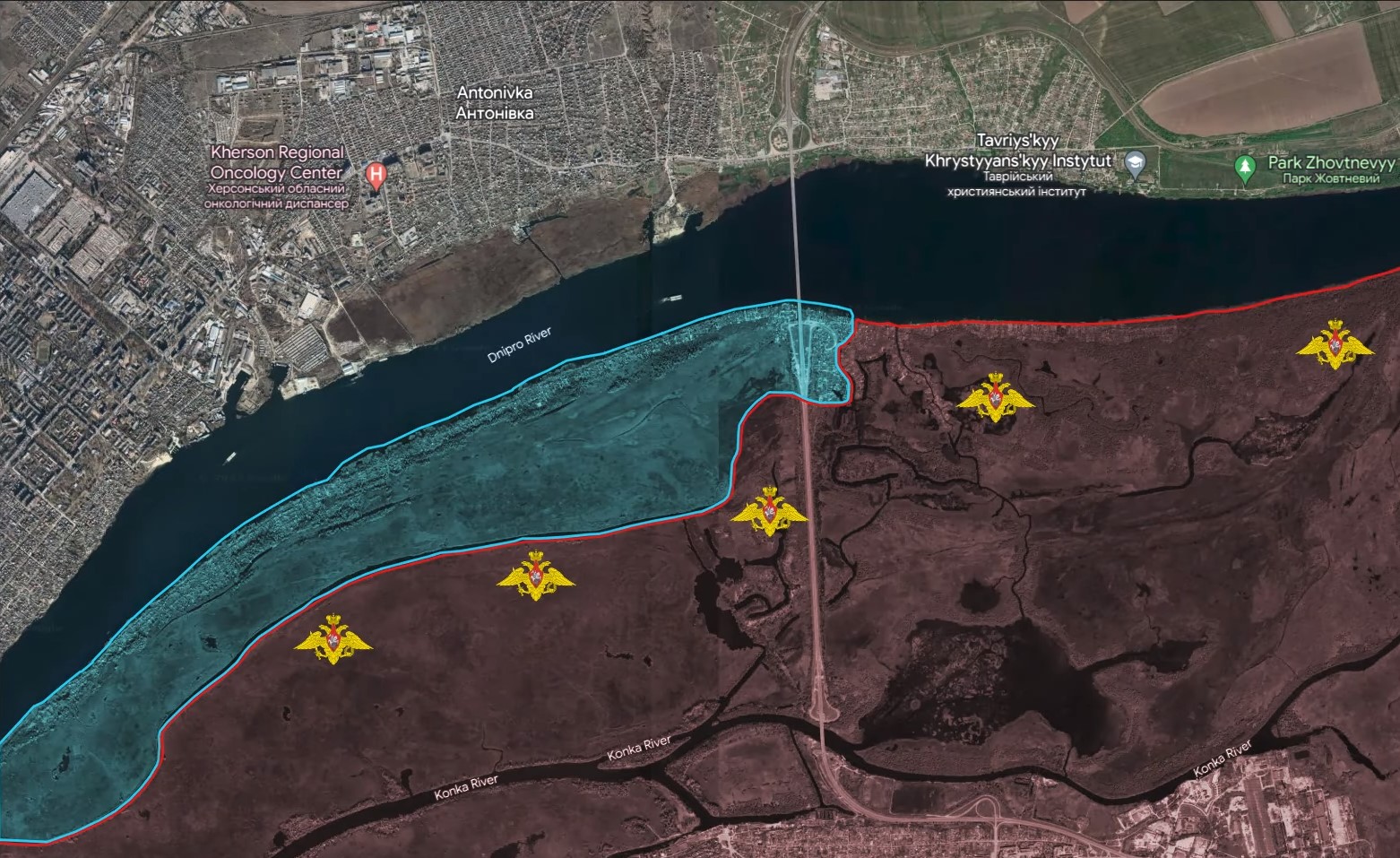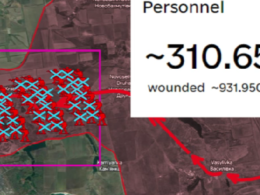The Russian military allegedly used chemical weapons against the Ukrainian military and civilians in Mariupol. New wave of mobilization is announced in the Luhansk Oblast, many people are trying to avoid the draft. Russian troops tried unsuccessfully to seize the city of Sievierodonetsk in the east. More rocket attacks on the Ukrainian cities and villages.
Morning report day 48 – April 12
Situation
According to information from the General Staff,
Russian forces are trying to complete the regrouping and relocation of units to areas of concentration in the Belgorod and Voronezh regions of the Russian Federation, as well as the relocation of air and space forces to airfields in the immediate vicinity of Ukraine’s eastern borders.
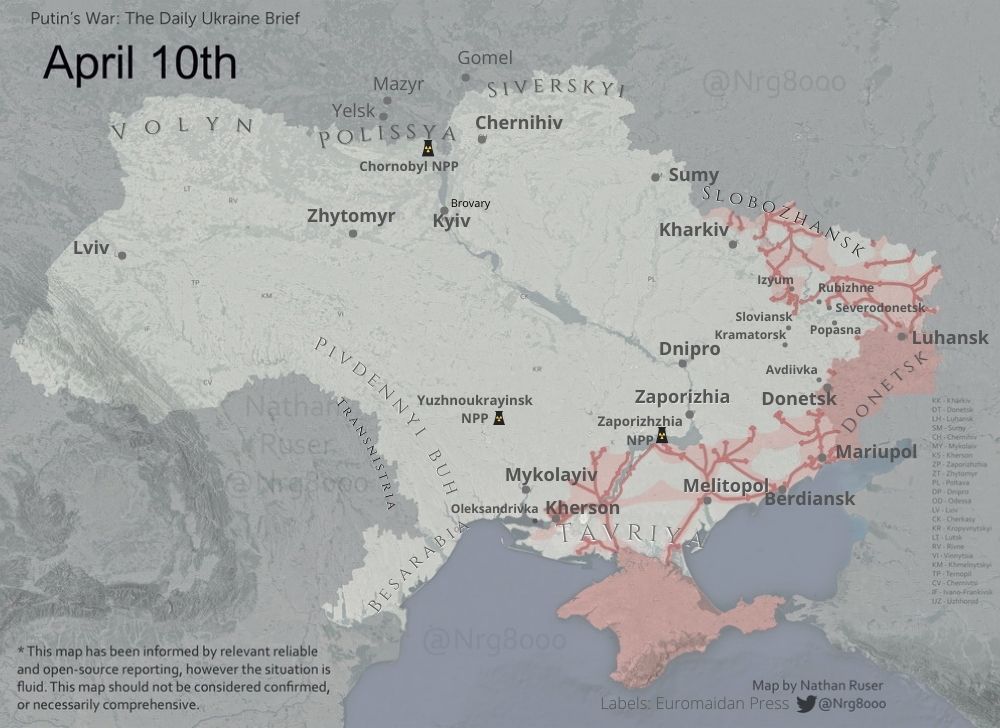
In the Volyn and Polissya directions, the Russian forces did not take active action. No changes in the position and actions of enemy units in these areas have been recorded.
In the Siversky direction, the enemy completes the redeployment of individual units to the eastern operational zone. Units of the 41st Combined Arms Army of the Central Military District are being relocated to designated areas in the Belgorod and Voronezh oblasts.
In the Slobozhansky direction, enemy troops continue to partially block the city of Kharkiv.
- In the area of the city of Izium, the Russian forces are fighting with separate units of the 1st tank and 20th Guards Combined Arms Army. It conducts air reconnaissance in order to identify the positions of units of Ukrainian troops and determine the routes of their deployment.
- In the area of the city of Izium, the Russian occupiers are trying to keep the frontlines that were captured earlier.
In the Donetsk and Tavriya directions, the Russian forces are fighting and holding certain borders with forces from the Southern Military District. It carries out the movement of additional units to conduct hostilities on the territory of Ukraine.
- There are signs of strengthening the air defense system in the areas of Melitopol and Ilovaisk.
- It is likely that in the future the enemy will try to take control of the city of Mariupol, capture Popasna and launch an offensive in the direction of Kurakhove in order to reach the administrative borders of the Donetsk oblast.
- Russian forces tried to storm the city of Sievierodonetsk but were unsuccessful. During the Popasna attack, it used the Tochka-U tactical missile system. Attempts to advance deep into Ukraine defenses to improve the tactical situation were unsuccessful.
- In the territory of Donetsk and Luhansk oblasts, our soldiers repulsed six enemy attacks and destroyed four tanks, five armored units, twenty-six vehicles and eight enemy artillery systems.
In the Pivdennyi Buh direction, the enemy holds certain boundaries by units of the Southern Military District. It replenishes regular losses in manpower and equipment. It tries to ensure the survival of its own control points. The Russian forces do not stop trying to gain a foothold on the administrative borders of the Kherson oblast.
- The Russian occupiers are trying to improve the tactical situation and gain a foothold on the administrative borders of the Kherson oblast. There are many cases of desertion in enemy units.
- Mobile patrols and posts from among the mobilized residents of the temporarily occupied territories of Luhansk and Donetsk oblasts operate in the temporarily occupied territories of Zaporizhzhia oblast.
In the waters of the Black and Azov Seas, Russian naval groups continue to perform tasks related to the isolation of the area of hostilities, reconnaissance, and fire support of ground units.
The Air Force of the Armed Forces of Ukraine has hit seven air targets in the previous day: one plane, two helicopters and four unmanned aerial vehicles.“
A possible chemical attack on Mariupol on Monday 11 April was reported by the Azov Regiment. According to the information yet to be further confirmed and detailed, around 9 PM, the Russian occupiers used a poisonous substance of unknown origin against the Ukrainian military and civilians in Mariupol. It was inflicted by an enemy drone. The victims were diagnosed with respiratory failure and vestibular-atactic syndrome.
Earlier, the Russian media had announced an attack of this kind. In particular, the so-called “leader” of the so-called “DNR” called for “turning to the chemical troops” to poison people in the Azovstal area.
The 36th Separate Marine Brigade of the Ukrainian Armed Forces said that the unit in Mariupol was running out of ammunition, the situation was very difficult, April 11 could be the last battle, and there was no support or contact with the authorities, Ukrainska Pravda reports. Currently, half of those who survived in the brigade are wounded.
“Today will probably be an extreme battle, as there is no ammunition left. Then – in hand-to-hand combat. Then, for some, death, and some, captivity.”
Eduard Basurin, a Russian militant from occupied Donetsk, said that Ukrainian defenders of Mariupol should be blocked at the Azovstal plant and then attacked with chemical weapons, RIA Novosti reported.
https://twitter.com/EuromaidanPress/status/1513788608850841602?s=20&t=-9Q57sAyKEttU22WXLMSEA
The Russians are preparing for guerrilla war on their territory, the Defense Intelligence of Ukraine (DIU) claims. The Ministry of Transport of the Russian Federation is obliged to ensure the interaction of the Russian Railways with the Ministry of Internal Affairs and the FSB. Increased security measures are associated with “the threat of interference in the operation of transport infrastructure facilities located on the borders of the Rostov region and the Krasnodar Territory.”
The counter-sabotage measures on Russian railways were introduced for the first time since the beginning of the aggression against Ukraine. After the failure of the initial plan, their action is regularly continued and strengthened. This increase in readiness is due in part to the actions of the Belarusian “rail guerrillas”, who purposefully disrupt the railway connection with Ukraine to complicate the delivery of reinforcements from the combat zone. And recent explosions near Belgorod at a local oil depot and ammunition depot have caused panic in Russia’s neighboring regions. This marked the beginning of guerrilla warfare and the transfer of hostilities to the territory of the Russian Federation.
During the last 24 hours, the Ukrainian General Staff has reported on the Russian manning and logistic challenges:
- In order to quickly replenish the losses of its troops, the occupation authorities announced another wave of mobilization of men under 65 in Luhansk. Soldiers of the Armed Forces of the Russian federation conduct raids on utilities and factories to identify conscripts and forcibly send them to military registration and enlistment offices.
- At the same time, in Alchevsk, with the beginning of hostilities, more than 300 people among the mobilized locals lost their lives. More than 1,200 people have been brought to a hospital in Donetsk since the beginning of the large-scale war.
- Among the personnel of the occupation units in the temporarily occupied territory of the Autonomous Republic of Crimea there is information that the Armed Forces of Ukraine are planning a counteroffensive in the Kherson oblast with the possibility of success and entry into the Crimean Peninsula.
According to British Defense Intelligence, (last 24 hours):
- Fighting in eastern Ukraine will intensify over the next two to three weeks as Russia continues to refocus its efforts there.
- Russian attacks remain focused on Ukrainian positions near Donetsk and Luhansk with further fighting around Kherson and Mykolaiv and a renewed push towards Kramatorsk.
- Russian forces continue to withdraw from Belarus in order to redeploy in support of operations in eastern Ukraine.
As of Tuesday 12.04.2022, the approximate losses of weapons and military equipment of the Russian Armed Forces from the beginning of the war to the present day: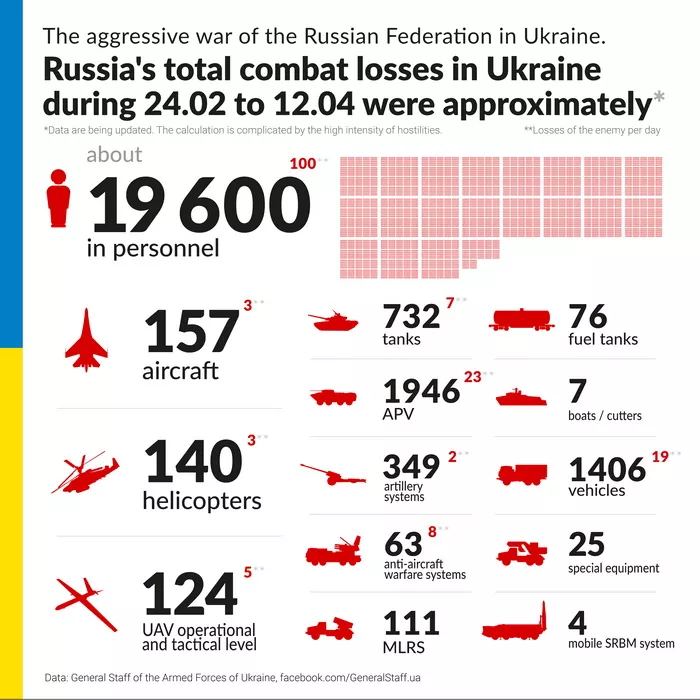
- Personnel – more than 19600 people (+100),
- Tanks – 732 units (+7),
- Armored combat vehicles – 1946 units (+23),
- Artillery systems – 349 (+2),
- Multiple rocket launchers – 111 (no change)
- Air defense means – 63 (+8),
- Aircraft – 157 (+3),
- Helicopters – 140 (+3),
- Automotive technology – 1406 (+19),
- Vessels/boats – 7 units (no change),
- Fuel and lubricant tanks – 76 (no change),
- UAV operational and tactical level – 124 (+5)
- Special equipment – 25 (no change)
- Mobile SRBM system – 4 (no change)
Humanitarian
According to UNHCR 4,547,735 refugees have been registered as of April 10. The UN says that so far Poland has taken in 2,622,117 refugees, Romania 692,501, Hungary 424,367, Republic of Moldova 411,365, Russia 404,418, Slovakia 317,781 and Belarus 20,739. Among those who fled Ukraine are also Ukrainian nationals with dual citizenship. An additional 113,000 people moved to the Russian Federation from the Donetsk and Luhansk regions between 21 and 23 February.
OHCHR recorded 4,335 civilian casualties in Ukraine as of midnight of April 10. 1,842 were killed (including 148 children) and 2,493 injured (including 233 children).
Nearly two-thirds of Ukraine’s children have been displaced in just six weeks of full-scale Russia's war against Ukraine,–UNICEF https://t.co/3GQliBJ5MO
Photo by Dmitry Smolenko pic.twitter.com/24KG1EKcaV— Euromaidan Press (@EuromaidanPress) April 12, 2022
186 children were killed, and 344 children injured, the Office of the Prosecutor General of Ukraine reports as of 8 a.m. on April 12.
The agreed humanitarian corridors allowed for the evacuation of 4,354 people on April 11. According to the Deputy Prime Minister and Minister of Reintegration of Temporarily Occupied Territories of Ukraine:
From Mariupol and Berdiansk, 3,854 people travelled to Zaporizhzhia by their own transport and evacuation buses. Including 556 people from Mariupol; and 3298 people – residents of the cities of Zaporizhzhia oblast (Polohy, Vasylivka, Berdiansk and Melitopol).
For the third day, the occupiers are violating agreements to ensure the passage of a convoy of buses from Zaporizhzhia to evacuate people from Berdiansk, Tokmak and Energodar. They are holding them at a checkpoint in Vasylivka.
At the same time, more than 500 people were evacuated from the cities of Lysychansk, Sievierodonetsk, Rubizhne, Kreminna and Popasna of Luhansk oblast, despite constant violations of the ceasefire by the occupiers.
Environment
Enemy forces destroyed or damaged 166 cultural sites in Ukraine, Ukrinform reports. “We are keeping official records on the ministry’s website. There are already 166 cultural heritage sites that were destroyed or damaged in the Russian invasion. We don’t know about some of the objects yet because they are located in the occupied territories. There is evidence, and we are verifying these data, and it is obvious that we are talking about reparations and restoration by the aggressor state,” Minister of Culture and Information Policy Oleksandr Tkachenko stressed.
Legal
Russian forces are holding approximately 1,700 Ukrainians captive, Reuters reports. Out of the 1,700 soldiers and civilians being held by Russia and pro-Russian separatists, about 500 are women, says Deputy Prime Minister Iryna Vereshchuk. “They force them to stand, don’t let them sit down. They shave their heads; they force them to undress every day for checkups. They humiliate their human dignity. I know facts of rape, I saw spines that had been beaten, she said, Moscow says it is providing Ukrainian POWs with everything necessary and “highly qualified medical care” in accordance with international law. In turn, Russia accuses Ukraine of torturing its POWs, an allegation rejected by Kyiv, which also says it upholds international agreements.” ME: Russia is, however, left with no credibility whatsoever
A French detachment of technical and scientific gendarmes has arrived in Lviv to assist their Ukrainian colleagues in the investigations of war crimes committed around Kyiv, the French Ambassador to Ukraine wrote on Twitter. France is the first to provide such help. They will start their mission Tuesday 12 April.
"The shots from the IFV were explosive, so the woman in front had her head immediately torn off," – this is now routine comments of Kyiv police documenting numerous cases of cars shot by Russian invaders near Kyiv. The family of 5 was killed in this car.https://t.co/RQrTwVPm9g pic.twitter.com/m9vTWoCDqU
— Euromaidan Press (@EuromaidanPress) April 12, 2022
Defense Intelligence of Ukraine (DIU) has published the data on the Russians who committed atrocities in Borodyanka, Ukrainska Pravda reports. According to DIU, servicemen of the 234th Airborne Assault Regiment of the Russian Federation took part in committing war crimes against Ukrainians in Borodyanka, Kyiv oblast. The DIU has released a list of servicemen containing names, positions, dates of birth, as well as details of close relatives.
6036 crimes of aggression and war crimes and 2772 crimes against national security were registered as of 12 April. 938 educational establishments are damaged as a result of shelling and bombings, 87 of them are destroyed fully.
According to the General Staff:
- The Russian occupiers, ignoring the norms of international humanitarian law, continue to use tactics of placing equipment and manpower directly to housing. Thus, in the temporarily occupied territories of Zaporizhzhia and Kherson oblasts, the Russian occupiers use the premises of agricultural enterprises, energy and social infrastructure facilities, and the central districts of settlements. Cases of enemy fighting in civilian clothes have been reported.
- Russian occupying troops are trying to carry out measures of information and psychological influence on the people of Kherson city and the oblast. To do this, they distribute information bulletins containing distorted information about the course of hostilities, substantiate the so-called “special military operation” of the Russian occupiers, and impose on citizens of Ukraine registration of social benefits, including pensions in accordance with norms and rules established in the Russian Federation. dissemination of information about Russian telegram channels in which allegedly “reliable” information is disseminated.
Support
One of the most difficult battles awaits Ukraine, Ukrinform reports citing President Zelenskyy. Ukraine is bracing for one of the most difficult battles, and whether the country will survive depends on foreign assistance, including that from the United States. That’s according to Ukrainian President Volodymyr Zelenskyy, who spoke in an interview with 60 Minutes on CBS.
The president added that Ukraine has been receiving military aid from the United States, but the country needs more. “They (the United States – ed.) help. I’m going to be honest with you, I would like more help. I don’t know if I have the right to say so, I had no other choice and I still don’t. But the fact that the US helps a lot is true,” said Zelenskyy.”
EU seeks unity amid calls for fresh sanctions on Russia, France24 reports. Horrified by the devastation wreaked by Russian troops in Ukraine, EU foreign ministers launched discussions Monday on the sixth round of sanctions, but a consensus was proving increasingly difficult. The EU is now committed to “rolling sanctions” on Russia. But it has so far held back from those which would hit Moscow’s coffers the hardest: a boycott of Russian oil and gas exports. EU consensus and unity are seen as a challenge. One obstacle to widening energy sanctions is Hungarian Prime Minister Viktor Orban who has refused to take them further. Another is the dependence on Russian hydrocarbons by Germany, Austria, Bulgaria, Italy, and some other EU countries. EU sanctions require unanimity from all 27 member states. “Discussing Ukraine means certainly to discuss the effectiveness of our sanctions,” Josep Borrell said.
Russia is trying hard to disrupt arms supplies to Ukraine, the European Truth reports. “The Russian Federation is making every effort to disrupt arms supplies to Ukraine, including through disinformation campaigns”, the Minister of Foreign Affairs Dmytro Kuleba wrote on Twitter. Russia knows that arms supplies are important to Ukraine and is mobilizing every effort to undermine them. Moscow has launched a large-scale information campaign aimed at foreign media and politicians.
New developments
Possibly chemical attack in Ukraine.
Pentagon monitoring reports of possible Russian chemical weapons attack in Mariupol, CNBC reports.
“Defense Department press secretary John Kirby said the Pentagon was closely monitoring reports Monday evening of a possible Russian chemical weapons attack on the besieged Ukrainian city of Mariupol. If Russia were found to have used chemical weapons in the strategic holdout city, it would represent a major escalation of the conflict and present a direct challenge to NATO to act.
The UK is “working urgently” to verify details following unconfirmed reports of Russia using chemical agents in an attack on a besieged city in Ukraine, the foreign secretary has said, SkyNews reports. Liz Truss said any confirmed use of such weapons in Mariupol would be a “callous escalation” of the war.”
Russia will not pause military operations in Ukraine for peace talks, Reuters reports. “Russia will not pause its military operation in Ukraine for subsequent rounds of peace talks, Russian Foreign Minister Sergei Lavrov said on Monday. Russian officials say peace talks with Ukraine are not progressing as rapidly as they would like and have accused the West of trying to derail negotiations by raising war crimes allegations against Russian troops in Ukraine, which Moscow denies. Lavrov last week accused Kyiv of presenting Moscow with an “unacceptable” draft peace deal that deviated from agreements the sides had previously reached.”
Talks with Putin left ‘no optimistic impression’, The Guardian reports citing the Austrian chancellor. Karl Nehammer has said he told Vladimir Putin in Moscow that ‘all those responsible for war crimes must be brought to justice, in the first face-to-face talks between a western leader and the Russian president since the invasion of Ukraine.
“As European Union, we are doing everything we can to stop the bloodshed Russia is causing in Ukraine: through diplomacy, sanctions, economic support and weapons for Ukraine”, Josep Borrell, High Representative of the EU for Foreign Affairs and Security Policy, wrote on Twitter yesterday. He said the Russian military was preparing a fresh offensive in eastern Ukraine, DW reports. “This battle will be fought with vehemence,” he said, urging civilians in the contested areas to escape the fighting. The Austrian premier also said had told Putin sanctions would remain in place — and would even increase — as long as Ukrainians are being killed.
“Normally wars have been won or lost on the battlefield, yes,” Josep Borrell said upon arrival for a meeting of the EU foreign ministers in Luxembourg, when asked to comment on Russian criticism for saying that the battle will be won on the battlefield. Do you still believe that this will be the case? His response was slightly reformulated to create the basis for strong reactions in Russian media. “Blend of hypocrisy and blackmail”, TASS reports. EU top diplomat confirms commitment to military solution to Ukrainian conflict, TASS stated.
Assessment
On the War
The Institute for the Study of War has made the following assessment as of Monday 11 April:
Russian forces continued assaults in the past 24 hours and claimed further advances, but ISW cannot independently verify any territorial changes. Russian media outlet RT shared unmanned aerial vehicle (UAV) footage on April 11 confirming that Russian forces have bisected Ukrainian defenders between the Azovstal Plant in eastern Mariupol and a second group of Ukrainian forces in the Port of Mariupol in the southwest, which ISW previously reported on April 10. DNR head Denis Pushilin claimed that Russian forces have cleared 80% of Mariupol (which ISW cannot independently confirm) and falsely claimed they fully control the Port of Mariupol as of April 11, directly contradicting the RT claim and ISW‘s assessment that Ukrainian forces retain control of the port. The Commander-in-Chief of the Ukrainian Armed Forces stated the Ukrainian defense is continuing to “hold the city, durably and sustainably.” Russian forces will likely complete the capture of Mariupol in the coming week but have likely suffered high losses.
Russian forces failed to make significant advances in continued assaults on Sievierodonetsk, Popasna, and Rubizhne on April 11. The Ukrainian General Staff stated Ukrainian forces repulsed four Russian attacks in Donetsk and Luhansk Oblasts and claimed Ukrainian forces destroyed a battalion tactical group (BTG) of the 70th Motorized Rifle Regiment, killing the battalion commander and his Chief of Staff. The Russian 60th Separate Motorized Infantry Brigade of the 5th Combined Arms Army is likely preparing to deploy into Donbas. Russian forces continue to redeploy from northeastern Ukraine to support operations in Donbas, and social media users filmed a large column of Russian military equipment reportedly withdrawn from the Kyiv axis moving west toward Donetsk in Matveev Kurgan, Rostov Oblast on April 11.
Russian forces continued to amass troops in Kharkiv Oblast to reinforce offensive operations on the Izium axis on April 11. Elements of the 6th Combined Arms Army and Northern Fleet continued operations to fix Ukrainian forces in place in Kharkiv city and screen Russian assembly areas. Satellite imagery showed likely elements of the 237th Tank Regiment accumulating in new camps in Russia’s Belgorod region, about 30km from the Ukrainian border.
Russian troops reinforced forward positions and conducted limited attacks near Izium on April 11. The Ukrainian General Staff reported that two Russian Battalion Tactical Groups (BTGs) unsuccessfully attempted to take Dovhenke and Dmytrivka, about 26 and 35 km south of Izium respectively. Kharkiv Regional Administration Head Oleg Synegubov claimed that Ukrainian Armed Forces destroyed a large column of Russian equipment and manpower heading toward Izium on April 10, but ISW cannot independently confirm this claim.
Russian forces did not make any significant advances against Ukrainian positions in Kherson Oblast and continued to attempt to improve their defensive positions on April 11.
Key Takeaways
- Russian Commander of the Southern Military District Army General Alexander Dvornikov is the natural choice to take overall command of Russian operations in Ukraine. There is no reason to suppose Dvornikov was selected for any particular skills or experience, nor is there reason to think the conduct of the Russian war effort will materially change more than it was already changing due to the Russian abandonment of northeastern Ukraine and focus on the east.
- Russian forces may have used chemical weapons against Ukrainian defenders in Mariupol, though ISW cannot independently verify Ukrainian claims at this time.
- Russian forces failed to make significant advances in continued assaults on Sievierodonetsk, Popasna, and Rubizhne in eastern Ukraine.
- Russian forces continued to amass troops in Kharkiv Oblast to reinforce offensive operations on the Izium axis and conducted several minor attacks.“
Consequences and what to do?
In a joint statement released on Thursday 24 March, the leaders of the Group of Seven industrialized nations (G-7) warned Russia against using biological, chemical or nuclear weapons against Ukraine. US President Joe Biden said later that a chemical attack by Russia “would trigger a response in kind,” without specifying exactly how severe that response would be. Biden said that the most important priority of the meetings was for the West to stay united in its responses. According to BBC, US President Joe Biden has said NATO “would respond” if Russia used chemical weapons in Ukraine.
Assessment by Hans Petter Midttun
If the Russian use of chemical weapons are confirmed, this might potentially become a turning point of the war. Even though NATO has intentionally never declared a red line, this could be the one utterly unacceptable act that could trigger the Alliance into action.
Towards the end of 2012, we received the first reports of small-scale chemical weapons use. The US intelligence community was resistant to snap judgments, particularly after the experience of inaccurate statements made about weapons of mass destruction in Iraq before the 2003 US invasion. So it took a period of months before the intelligence community formally determined that the Assad regime had in fact used chemical weapons in April 2013, Ben Rhodes, the former deputy national security adviser to Barack Obama, wrote. The question then became what we were going to do about it. Our initial response was unsatisfying: Obama decided to publicize a decision to provide military support to the Syrian opposition. On August 21, 2013, news broke of a catastrophic chemical-weapons attack in Syria; within a matter of days, the intelligence community had a “high confidence assessment” that a sarin gas attack had killed more than a thousand people in a suburb of Damascus, and that the Assad regime was responsible.”
Failing to get support from neither Congress nor Allies, the USA and Russian Federation agreed to work together to ensure the destruction of Syrian government’s arsenal of chemical weapons. In response to the red line warning, a US-Russian agreement was signed in 2013 on the destruction of the Syrian government’s arsenal of chemical weapons. In August 2014, the White House hailed the destruction of 581 tons of sarin and 19.8 tons of mustard gas under the OPCW’s supervision.
In the following years, however, the world learned that Syria had not lived up to its commitment to destroy its stock of chemical weapons. Several attacks involving chemical weapons were documented.
President Obama’s statement that the use of such weapons is a “red line” and that crossing it would entail “enormous consequences” persisted, ostensibly, as an empty threat.
It took nearly 6 years from the initial report before the US, Britain and France launched airstrikes on 13 April 2018 against Syrian research, storage and military targets as a response to its use of chemical weapons.
Whether the Russian alleged use of chemical weapons in Mariupol will be a “turning point” or not, remains to be seen.
Firstly, the claim of its use needs to be proven. As Russia takes control over Mariupol it will make sure the world will never be able to prove its use of chemical weapons. No international or independent experts will be allowed into the city to investigate. All victims of the horrendous attack will disappear, either cremated or buried.
Secondly, President Biden will seek a joint response from his European partners. They will probably still be reluctant to engage militarily in Ukraine for one of the four different reasons:
- National interests. Economic ties, energy dependency, and diplomatic relations are presently stopping the EU from deciding on a package of sanctions that will cripple the Russian economy and its ability to wage war.
- Lack of Will (or willingness). Casualty sensitivity has been one of the factors shaping liberal democracies’ behaviour, with Western politicians preferring to avoid direct engagement in wars or to limit the use of ground forces, even at the price of compromising objectives and deterrence.
- Lack of Ability (or capability). Many countries might be willing to engage militarily but find themselves unable to do so because of more than 20 years of downsizing and streamlining their armed forces.
- The “fear of WW3”, which theoretically, might be the reason for some nations to draw a red line.
NATO has not defined a red line for a reason. It is not willing to be drawn into a war by accident. If it decides to intervene, it will be after long and careful deliberations. I hope this includes an assessment of the potential consequences of a Russian victory in Ukraine.
In my opinion, the consequences for both Ukraine and Europe would be devastating. Plus, the Hybrid War is in a sense like a pandemic. Lacking a resolute response and extreme measures, it is bound to spread. It is time for the West to change its strategy toward Russia.
As previously stated, I fear that President Biden’s aims of full NATO unity in the face of the massive atrocities taking place in Ukraine will come back and haunt the Alliance.




